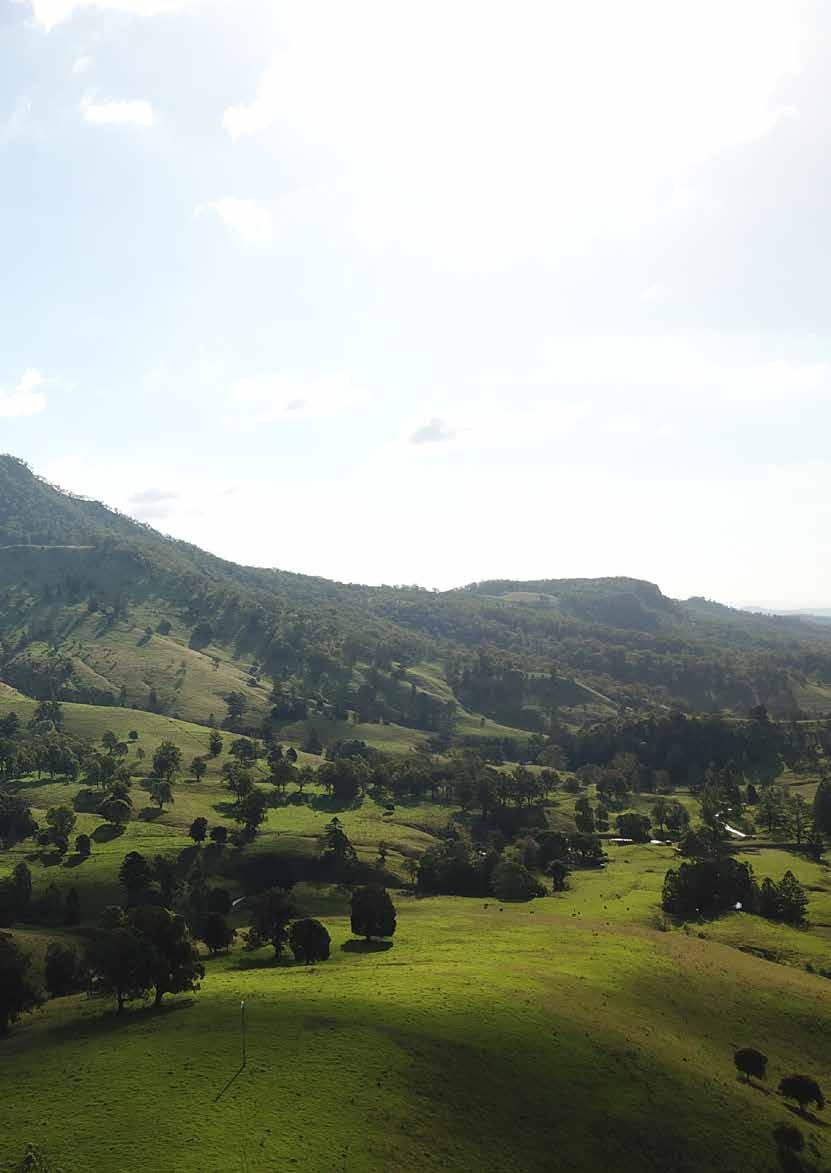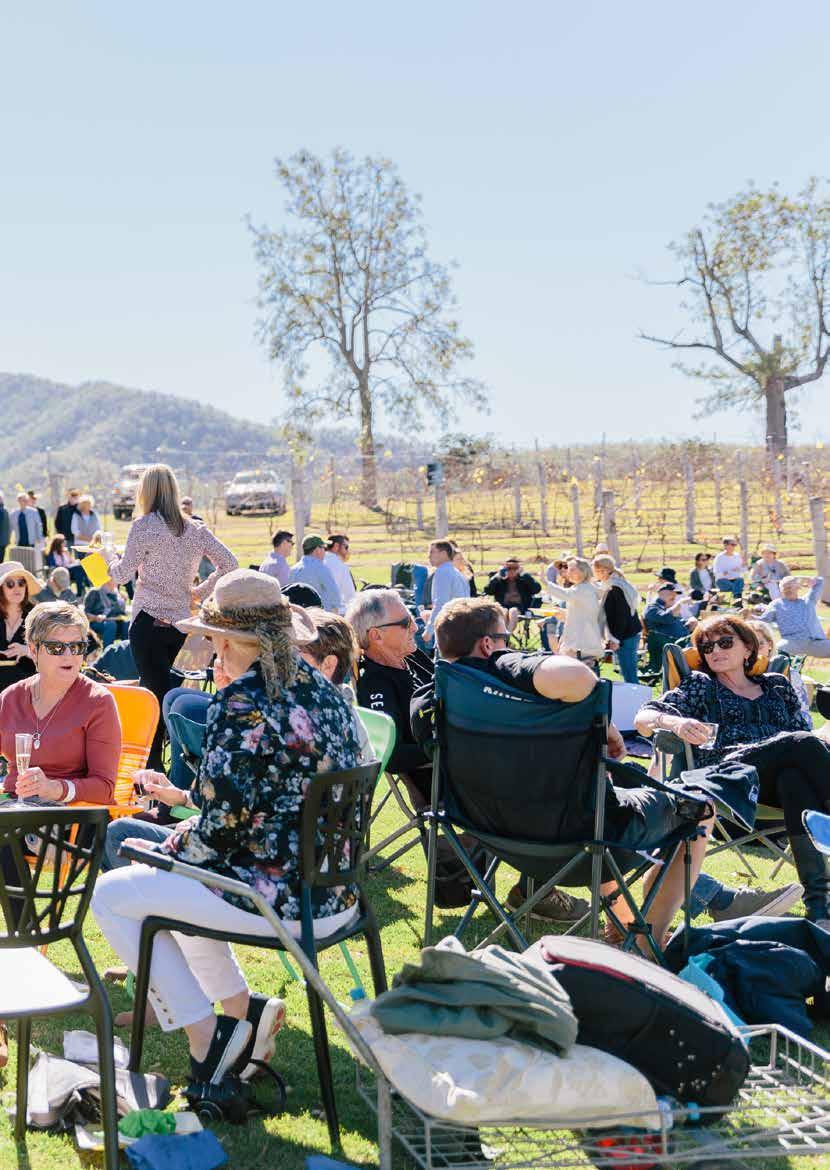
14 minute read
Open and Responsive Government
ANDOpen Responsive GOVERNMENT
Council is committed to ethical and transparent leadership and a robust governance framework that supports a customer-first focus and the delivery of ‘value-for-money’ services to the Scenic Rim community.
PROVIDING ASSURANCE
Scenic Rim Regional Council’s Audit and Risk Committee provides independent assurance and assistance to Council on: • the risk, control and compliance framework • Council’s Strategic and Operational Risk Registers • Council’s Risk Management Systems, and • Council’s external accountability responsibilities as prescribed by the Local Government Act 2009 and the Local
Government Regulations 2012. It comprises four members, two internal members – Mayor Greg Christensen and Councillor Nigel Waistell - and two independent external members – Jason Evans (Chair) and Amanda Pafumi. The committee does not replace or replicate established management responsibilities and delegations, the responsibilities of other executive management groups within Scenic Rim Regional Council, or the reporting lines and responsibilities of external audit functions. As required by legislation, it provides prompt and constructive reports on its findings directly to Council. The committee is directly responsible and accountable to the full Council for the exercise of its duties and responsibilities. In carrying out its duties and responsibilities, the committee must at all times recognise that primary responsibility for management of Scenic Rim Regional Council rests with the Chief Executive Officer. In discharging its responsibilities, the committee has the authority to: • conduct or authorise investigations into matters within its scope of responsibility • access information, records and personnel of Scenic Rim
Regional Council for such purpose • request the attendance of any employee, including executive staff, at committee meetings • conduct meetings with Scenic Rim Regional Council’s internal and external auditors, as necessary, and • seek advice from external parties, as necessary. Council has a focus on continuous improvement and its internal audit function supports the move towards more efficient and effective processes and systems. Through the internal audit role, Scenic Rim Regional Council has the following goals: • assurance that processes and internal controls are in place to ensure accountability and compliance • assurance that Council’s systems and governance produce expected outcomes • identification of opportunities for improved performance and efficiencies, and • identification of processes to reduce Council’s risks. Scenic Rim Regional Council’s internal auditors were BDO Australia (Brisbane)*. As Council’s contracted internal auditor, BDO Australia (Brisbane) was responsible for: 1. reporting to the Chair of the Audit and Risk Committee or the
Chief Executive Officer (recognising that the primary reporting relationship is to the Audit and Risk Management Committee) 2. preparation and development of an annual audit plan, in conjunction with the Audit and Risk Committee, based on
Queensland Treasury’s Audit Committee Guidelines, which also incorporate a risk-based approach 3. preparation of an internal audit program in conjunction with the Audit and Risk Committee, which includes the scope and objectives of internal audits 4. completion of fully detailed working papers and internal audit reports, or such reports as may be required, and 5. carrying out the internal audit function within contemporary developments in auditing, local government, public sector and management philosophies and best practices.
In the 2018-19 financial year until the cessation of its contract in February 2019, BDO Australia (Brisbane) focused on the following areas, over several audits and as contained in the proposed threeyear audit plan: • customer request management and escalation processes • IT security including cyber risk assessment and social engineering • help/service desk management • capital planning, procurement and management, and • fleet management, maintenance, efficiency and optimisation. * Scenic Rim Regional Council ended its arrangements with BDO
Australia (Brisbane) in delivering the Internal Audit Function for
Council in February 2019. Elements of the Internal Audit functions continued to be delivered by Council officers. It is proposed that, following Council’s appointment of its Principal Specialist Internal
Audit Risk and Improvement, the internal audit functions will be managed within that position.
MANAGING RISK
Scenic Rim Regional Council was named the best council in Queensland in 2018-19 for its commitment to delivering an effective risk management framework. The Excellence in Risk Management award was presented to Council at the Local Government Association of Queensland conference in Brisbane in November 2018. Council’s entry focused on the maturity of enterprise risk management, demonstrating how its responsive approach enables it to effectively manage its strategic and operational risk profile. The Excellence in Risk Management awards provide councils with the opportunity to share ideas, progress opportunities and enhance enterprise risk management across Local Government Mutual Liability Scheme members. Council’s commitment to continuous improvement and robust risk mitigation strategies has seen it recognised in awards by Local Government Mutual in 2010, 2011 and 2015. Risk management principles are integrated into Council’s decision making and business processes and the Risk Management Framework is regularly reviewed to ensure it is robust and effective. As required under the Local Government Act 2009 and the Financial and Performance Management Standard 2009, Council has an Audit and Risk Committee which meets quarterly. Its Risk Reference Group, comprising senior staff and an external advisor who meet quarterly, oversees the Risk Management Framework and monitors strategic risks and issues. Relevant strategic risks and an assessment of identified risks are included on meeting agenda papers for all Executive Team and Council meetings. Council’s commitment to continuous improvement in 2018-19 included the revision of its Risk Toolsheet, finalisation of Risk Appetite Statements, an in-depth review and revision of the Strategic Risk Register and the commencement of a thorough review of the Operational Risk Register.
SECURING CORPORATE DATA
Recommendations of a cyber-security audit conducted in 2017-18 have continued to be implemented, including the roll-out in 201819 of the Mobile Device Management program to secure smart phone and tablet access to Council’s ICT environment. The ICT Strategic Plan 2018-2020 was endorsed and a draft Cyber Security Incident Response Plan was developed. Work commenced in developing an ICT Disaster Response Plan to manage the threat of intrusion.
ENSURING A CULTURE OF WORKPLACE SAFETY
Council’s team approach to workplace health and safety aims to ensure that all staff ‘think safe, work safe and go home safe’. A wide range of workplace health and safety processes and procedures helps to ensure the health and wellbeing of employees and in 2018-19 there was a focus on the induction of contractors engaged by Council to ensure compliance with Council’s standards. Council’s focus on safety is reflected in its information sharing with staff and monitoring of compliance. Staff are required to complete monthly workplace health and safety questionnaires and the monthly staff newsletter includes a topical item relating to workplace health and safety. In 2018-19, an Incident Management Flowchart was developed to enable all employees to identify the appropriate processes to be followed when managing workplace health and safety incidents. Council provides an Employee Assistance Program, offering confidential counselling services for all employees and their immediate family members, to assist in preventing or resolving personal or work-related problems that may impact an employee’s wellbeing. During the 2018-19 year, some 93 counselling sessions were utilised by staff and their families. In conjunction with the Employee Assistance Program, Council worked with Mates in Construction to deliver a series of comprehensive information sessions on mental health awareness and suicide prevention in the construction sector. This included training key personnel to become Mates Connectors to assist a staff member in crisis and connect them to professional help.
REWARDING STAFF
Staff who contributed to an enviable safety record have enjoyed the rewards of Council’s cost savings. Council’s workplace insurance premiums have been declining as a result of safe work practices and reduced lost-time injuries across its workforce. Some of the savings provided for health and wellbeing activities for staff in 2018-19. These included neck and shoulder massages provided in-house by a local physiotherapist and cooking classes with a dietician on how to prepare time-saving, low-budget, nutritious meals. The table below captures the workplace Incidents that have resulted in lost time and the number of days lost due to these injuries.
FINANCIAL YEAR
2018-19 2017-18
LOST TIME INCIDENTS
7 5
DURATION RATE
61 days 252 days
LOST TIME INJURY FREQUENCY RATE
10.99 7.58
Delivering existing worker traineeships.

DEVELOPING OUR EMPLOYEES
Council has continued to strive to become an ‘employer of choice’ and to attract and retain the most qualified, experienced and committed staff to deliver an extensive range of services. Significant work was undertaken in 2018-19 to improve recruitment practices, including the redesign of application forms and simplifying processes for prospective applicants. To create a more skilled and agile workforce, Council is working closely with the Department of Education Small Business and Training to identify skills shortage areas and where future new traineeships can be integrated into Council. During 2018-19 there were five trainees, three of whom were retained by Council and successfully completed at least Certificate II tertiary qualifications. During this time an additional four trainees commenced courses which will be completed in early 2020. Council is committed to the professional development of employees and has introduced existing worker traineeships, offering qualifications in Certificate III Civil Construction and Plant Operation and Certificate IV Civil Construction for Supervisors. A total of 13 operational civil construction employees have been awarded these qualifications on the successful completion of their traineeships. Council has partnered successfully with the Acacia Ridge Community Support Inc’s Belong program which helps to establish pathways to employment for disadvantaged job seekers. Two programs, each of 18 weeks, were hosted by Council under the Skilling Queenslanders for Work program which provided traineeships for the completion of a Certificate I in Conservation and Land Management. Trainees from both programs have worked diligently to rehabilitate green spaces across the Scenic Rim.
MANAGING STAFF PERFORMANCE
The need for the introduction of a Performance Improvement Procedure (PIP) to complement the Personal Performance Development (PPD) process for the appraisal of staff was identified in 2018-19. The PPD form was revised and is intended to be distributed for completion across Council. This will provide some valuable data regarding performance and training needs. Council is keen to identify and implement a more contemporary way of undertaking annual performance appraisals. It has highlighted the need for employees to carry out a self-assessment and to meet face-to-face with their supervisor to hold a productive conversation about their performance. The PIP program provides supervisors and employees with the means to document and reflect on performance which requires a review or improvement.
NEGOTIATING THROUGH ENTERPRISE BARGAINING
The establishment of a Joint Consultative Committee (JCC) in 2018-19 has enabled the discussion and sharing of information about current employment terms and conditions and policies and procedures relating to Council’s workforce. Terms of Reference were established and two meetings held with representatives from Council’s Management Team and workplace delegates as well as union representatives. Council’s diverse workforce is represented on the JCC by the Australian Workers’ Union Queensland; The Services Union; Transport Workers’ Union; Professionals Australia; Automotive, Metals, Engineering, Printing and Kindred Industries, Industrial Union of Employees Queensland; and the Construction, Forestry, Mining and Energy, Industrial Union of Employees. Council has communicated with the unions its plans to begin consultation with employees in early January 2020 on a review of the current Enterprise Bargaining Certified Agreement.
DELIVERING QUEENSLAND GOVERNMENT SERVICES
Council has continued to deliver a convenient ‘one-stop-shop’ for Queensland Government services from the High Street Customer Service Centre in Boonah. Since its establishment in 2014, the Queensland Government Agent Program has continued to grow, providing members of the Scenic Rim community the convenience of local processing of licence renewals, driver testing, vehicle registration and applications for birth, death and marriage certificates without the need to travel to Ipswich or Beaudesert. During 2018-19, some 8,929 transactions were processed by Council’s customer contact staff.
MEETING INCREASED CUSTOMER SERVICE DEMAND
Staff at Council’s three Customer Contact Centres at Beaudesert, Boonah and Tamborine Mountain have continued to provide a high level of service to the community through incoming telephone calls and over-the-counter inquiries. Customer Contact staff continued to provide a wider range of services, receiving 48,647 calls, of which more than 7,600 requests for action were logged in 2018-19 via its call centres’ first point of contact solution. As the interface between the community and Council’s organisational areas, Customer Contact Centre staff ensure a customer-first focus and informed decision making in interactions with members of the community. Customers can request a new or replacement wheelie bin, report a lost or found animal, or have their rates queries addressed at the first point of contact. The growing demand for Council’s services was reflected in the 15.15 per cent increase in customer requests in 2018-19 from 2017-18.
IMPROVING PROCESSES
The rigorous preparation of Council’s 2019-20 budget was reflected in a number of new key initiatives and policies. In preparation for Council’s move from monthly to fortnightly Ordinary Meetings in July 2019, a revamped financial report was workshopped for Council to consider for adoption. The new format report aims to provide a clearer picture of Council’s financial position and ensure legislative compliance regarding financial disclosure. Council reviewed its procurement practices in 2018-19 to increase local purchasing to support Scenic Rim businesses, wherever possible. The initial focus was on ensuring equitable processes for sourcing vehicle and fleet replacements and led to the initiation of a formal list of Council pre-qualified light vehicle suppliers within Council’s VendorPanel software. This list has allowed the inclusion of applicable businesses within the Scenic Rim to be able to be considered. Further training in the utilisation of VendorPanel was also rolled out to key Council staff responsible for procurement to maintain compliance with legislative requirements. In addition, guidelines and a flowchart were developed to assist staff in ensuring Council’s procurement is effective and transparent. A Business Systems Review Project was commenced in 2018-19 to improve the efficiency of Council’s enterprise management software. Process mapping was undertaken across the organisation with data collated to press Council’s enterprise software provider to address key performance issues. Updates to a number of modules were considered and scheduled for implementation. A review of Council’s Customer Request Management Framework, which commenced in 2018-19, was broadened in scope to be incorporated in the Customer-Centric Organisation Project, which is taking an holistic and organisation-wide approach to improving Council’s interactions with its customers. As part of its Refresh and Refocus program which began in 2018, Council has reviewed its operations to ensure a ‘customer first’ approach in its delivery of services and facilities to the community.
MANAGING COMPLAINTS
Local governments are accountable to their communities and Council welcomes feedback, whether positive or negative. Council respects the right of individuals to lodge a complaint and is committed to managing complaints responsibly, efficiently, effectively, fairly and economically. Under the Local Government Act 2009, issues which are within the scope of Administrative Action Complaints about councils include: • a decision, or a failure to make a decision, including a failure to provide a written statement of reasons for a decision • an act, or a failure to act • the formulation of a proposal or intention, or • the making of a recommendation. Scenic Rim Regional Council manages Administrative Action Complaints through a three-stage process comprising: Stage 1: By the Council business unit to which the subject matter relates Stage 2: Internal review of Stage 1 decisions by the Chief Executive Officer Stage 3: External review of Stage 2 decisions by the Queensland Ombudsman’s Office. This process has ensured that matters raised have been adequately considered, that complainants have been afforded natural justice and the complaint issues have generally been resolved satisfactorily, as shown by the table below.
ADMINISTRATIVE ACTION COMPLAINTS
Stage 2 reviews Resolved under AAC Process Not resolved at end of period
2017-18
20 19 1
*Includes transfer of complaint not resolved in 2017-18
2018-19
7 6* 2
RESPONDING TO INFORMATION REQUESTS
The provisions of the Right to Information Act 2009 and the Information Privacy Act 2009 acknowledge the need for openness and accountability by government balanced by the need to protect individual privacy. Information held by Council may be released administratively on request if it is in the public interest to do so unless protected by the provisions of the Information Privacy Act 2009. Formal application processes are applied where information requests need to be assessed to determine if it is contrary to the public interest to give access. There were two outstanding Right to Information access applications at the end of the reporting period. There were no outstanding information privacy applications as at 30 June 2019.
RIGHT TO INFORMATION APPLICATIONS
On hand at start of period Received Withdrawn Finalised Outstanding at end of period
2015-16
1 5 2 4 0
2016-17
0 7 4 2 1
2017-18
1 9 2 6 2
2018-19
2 6 3 3 2
Recognising staff through the Valued Employee Award.


Managing customer requests.
Ensuring a customer-first focus.

LOOKING AHEAD An audit of Council will be undertaken by Local Government Workcare in the first quarter of 2019-20, with scheduled meetings with staff from all levels of the organisation and site visits to all areas within the region. This audit will form the basis of a final report which will enable the establishment of a revised Action Plan to identify areas for improvement and rectification.







